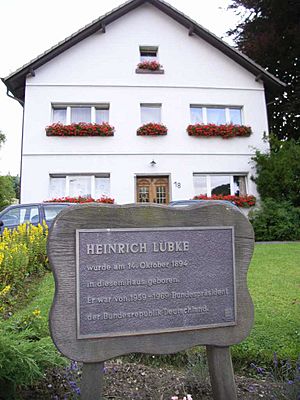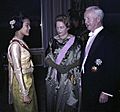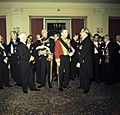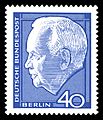Heinrich Lübke facts for kids
Quick facts for kids Heinrich Lübke |
|
|---|---|
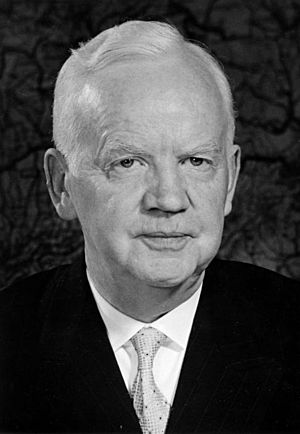
Heinrich Lübke in 1959
|
|
| President of Germany West Germany |
|
| In office 13 September 1959 – 30 June 1969 |
|
| Chancellor | Konrad Adenauer Ludwig Erhard Kurt Georg Kiesinger |
| Preceded by | Theodor Heuss |
| Succeeded by | Gustav Heinemann |
| Federal Minister of Food, Agriculture and Forestry |
|
| In office 20 October 1953 – 15 September 1959 |
|
| Chancellor | Konrad Adenauer |
| Preceded by | Wilhelm Niklas |
| Succeeded by | Werner Schwarz |
| Member of the Bundestag | |
| In office 6 September 1953 – 2 September 1959 |
|
| Preceded by | Franz Etzel |
| Succeeded by | Arnold Verhoeven |
| Constituency | Rees – Dinslaken |
| In office 14 August 1949 – 19 November 1950 |
|
| Preceded by | Constituency created |
| Succeeded by | Ernst Majonica |
| Constituency | Arnsberg – Soest |
| Minister for Food, Agriculture and Forests of the State of North Rhine-Westphalia | |
| In office 6 January 1947 – 1 January 1953 |
|
| Preceded by | Hermann Heukamp |
| Succeeded by | Johannes Peters |
| Member of the Landtag of North Rhine-Westphalia | |
| In office 1946 – 6 March 1954 |
|
| Personal details | |
| Born | Karl Heinrich Lübke 14 October 1894 Enkhausen, Kingdom of Prussia, German Empire |
| Died | 6 April 1972 (aged 77) Bonn, West Germany |
| Political party | Centre Party (Zentrumspartei) (1930–1933) Christian Democratic Union (1945–1972) |
| Spouse(s) |
Wilhelmine Keuthen
(m. 1929) |
| Signature | |
| Military service | |
| Allegiance | |
| Service/branch | |
| Rank | Captain in the reserve |
| Battles/wars | World War I |
Karl Heinrich Lübke (14 October 1894 – 6 April 1972) was a German politician. He served as the president of West Germany from 1959 to 1969.
Towards the end of his time in office, his health became worse. He became known for some embarrassing moments that might have been caused by his health problems. Lübke stepped down from his role three months before his second term was supposed to end. This happened during a time when questions were raised about his activities during the World War II era.
Contents
Early Life and Career
Heinrich Lübke was born in Enkhausen, Westphalia. He grew up in a simple family; his father was a shoemaker and farmer. Lübke trained as a surveyor.
When World War I began in August 1914, he volunteered to serve in the army. He fought on both the Eastern and Western Fronts. He was promoted to lieutenant in 1917 and received the Iron Cross for his service. He left the military in December 1918.
After the war, Lübke continued his education. He became a surveying and cultural engineer in 1921. He also studied economics. From 1922, he worked as a managing director for different agricultural associations.
In 1929, Heinrich Lübke married Wilhelmine Keuthen.
In 1930, he joined the Roman Catholic Centre Party. In 1932, he was elected to the Prussian Parliament. After the National Socialists came to power in 1933, his party was dissolved. Lübke faced accusations and was held for a while, but no evidence was found against him.
In 1937, he started working for a building company. By 1939, he was involved in large building projects, including the expansion of military test centers.
Political Career After the War
After World War II, Lübke returned to politics. He joined the CDU party in West Germany. In 1947, he became the Minister of Agriculture in the state of North Rhine-Westphalia. In 1953, Konrad Adenauer, who was the Chancellor, made him the Federal Minister of Agriculture in Bonn.
In 1959, Lübke was chosen to become the President of West Germany. This role was mostly ceremonial. He won the election in the second round of voting.
In 1964, he was re-elected for a second term. Before his re-election, he met with a leader from another major party, and they agreed on his re-election. This helped him get support from both main parties.
During his presidency, some questions were raised about his past. Accusations came from East Germany in 1966, suggesting he knew about the use of forced labor on his building projects during the war. They presented building plans with his signature as proof. However, these claims were dismissed in West Germany as propaganda. Even so, the possibility of a scandal could harm the office of the President. Because of this, Lübke announced in October 1968 that he would resign on June 30, 1969. This was three months before his term was officially supposed to end.
After leaving office, Lübke's health continued to decline. He suffered from a condition that affected his memory and speech. It later became clear that this illness had started several years earlier and explained some of his behavior during his last years as president.
Heinrich Lübke passed away on April 6, 1972, in Bonn, at the age of 77.
As a Public Speaker
Heinrich Lübke was not known for being a great public speaker. Towards the end of his time in office, his age and health issues affected his memory, leading to some memorable moments. For example, he sometimes forgot where he was speaking.
He was also known for his direct, word-for-word translations from German into English, which people often found amusing. This was sometimes called "Lübke English."
A German satirical magazine even collected recordings of his speeches and released them on a popular record.
Honours
National honour
 West Germany:
West Germany:
 Grand Cross Special Class (and former Grand Master) of the Order of Merit of the Federal Republic of West Germany
Grand Cross Special Class (and former Grand Master) of the Order of Merit of the Federal Republic of West Germany
Foreign honours
 Cameroon:
Cameroon:
 Ethiopia:
Ethiopia:
 France:
France:
 Grand Cross of the Order of the Legion of Honour
Grand Cross of the Order of the Legion of Honour
 Iran:
Iran:
 Malaysia:
Malaysia:
 Philippines:
Philippines:
 Thailand:
Thailand:
 United Kingdom:
United Kingdom:
 Honorary Knight Grand Cross of the Order of the Bath
Honorary Knight Grand Cross of the Order of the Bath
Images for kids
-
Heinrich and Wilhelmine Lübke with Queen Sirikit of Thailand in 1960
-
Lübke at a diplomatic reception in Bonn, 1961
-
Lübke with President of Kenya Jomo Kenyatta and his son Uhuru in 1966
See also
 In Spanish: Heinrich Lübke para niños
In Spanish: Heinrich Lübke para niños
 | James Van Der Zee |
 | Alma Thomas |
 | Ellis Wilson |
 | Margaret Taylor-Burroughs |


